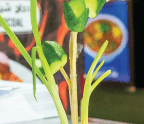I’ve always loved salmon. Not to eat, as I don’t eat fish, but I’ve always loved salmon in general because salmon jump and no one knows why. They jump all over the place—out of rivers, up waterfalls. Some say they jump to clean their gills. Others say they jump for joy, because they love the smell of fresh rainwater. Still others say they jump to view their territory. It is certain that the salmon are jumping, but there is no absolute certainty as to why they jump.
You could say that this is true of many things. We are certain we are alive, but we are uncertain why. We are certain we are conscious, but we are uncertain why. Almost all “why” questions draw you into a realm of uncertainty, from why salmon jump to why we live and die.
This story is partly about a beautiful salmon, and partly about the question of uncertainty. It’s also about the past and how we can’t get back there, except in our minds, and how this means the past is always uncertain.
I was living in Oslo at the time, studying philosophy at the university. Among the impressive tutors on the faculty, the best and greatest was an Icelandic philosopher called Alda Jónsdóttir. She was brilliant and also terrifying. She was a professor of logic but her main area was the things that fall out of sets. Superfluities, redundancies, gaps. She often said there were no sensible “why” questions, so we might as well discard them and move on to questions we could actually answer. She had masses of gray curly hair and she spoke and moved very quickly. In winter Oslo, the sidewalks are covered with a patina of treacherous ice. Nonetheless, Alda Jónsdóttir would stride along as if wearing crampons, in no danger of slipping at all, while I’d struggle beside her with little chastened footsteps, trying to stay upright on a surface that was more slippery than an ice rink. One day, when Alda Jónsdóttir was explaining something to me that I really didn’t understand, I slipped and landed with a hard thump on the ice, then slid on my ass downhill. As I struggled up again, Alda Jónsdóttir said to me: “Why did you do that?” Was that a philosophical joke? I wondered. Did philosophers make jokes?
It was Alda Jónsdóttir who invited me to dinner. An invitation from a terrifying person must, inevitably perhaps, be terrifying. Also I came from nowhere, I really had no idea about the customs of anywhere else. I was habitually terrified, and Alda Jónsdóttir was an apex of terror in the midst of my quotidian terrorscape.
I said yes, anyway, because I was curious, if terrified. I was slightly more curious than terrified. And I wondered various things, like (a) who Alda Jónsdóttir lived with, if anyone; (b) where she lived; (c) what it was like there; and (d) what she would cook for dinner, if she cooked. I couldn’t imagine Alda Jónsdóttir doing anything as ordinary as cooking dinner. There was also the question of why she had invited me. But, as she often said, this


